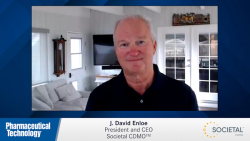
OR WAIT null SECS
Gaining a Market Pulse at CPhI
The perception of buyers of pharmaceutical ingredients and contract services in how they see market conditions and their own individual business prospects is an important barometer in assessing the market for pharmaceutical outsourcing and ingredients.
The perception of buyers of pharmaceutical ingredients and contract services in how they see market conditions and their own individual business prospects is an important barometer in assessing the market for pharmaceutical outsourcing and ingredients. The results of a survey released this week at CPhI Worldwide in Madrid were largely positive as buyers assessed market and business conditions for the next 12 months.
According to the survey, 97% of pharmaceutical buyers attending CPhI that were surveyed expect sales to increase or stay the same over the next 12 months (up from 90% over the last 12 months), and 90% rate their business opportunity in the global pharmaceutical market positively. The CPhI Worldwide survey, a pre-event survey conducted by UBM Live’s CPhI portfolio, polled nearly 1100 preregistered visitors representing pharmaceutical buyers. Attendees expect pockets of innovation to positively impact their overall business including GMP certification (64.8%), the rise in generics (58.6%), the move toward outsourcing (53.4%), and supply-chain security (50.4%).
Other key results show that 61% of visitors said that the current economic climate will have no impact or a positive impact on their business, and 53.2% of visitors said that the move toward outsourcing will have a positive impact on their business. Also, 91% of visitors said they use Internet to source products and services. And sustainability is also important with 90% of visitors rating sustainability as important to the future development of their company and 71% having a sustainability policy in place or in progress.
The results reflect improving pharmaceutical industry growth. Following several years of slowing growth, the global pharmaceutical market is expected to rebound from an expected low point of 3–4% growth in 2012 to 5–7 percent in 2016, according to the IMS Institute for Healthcare Informatics. Annual global spending on medicines will rise from $956 billion in 2011 to nearly $1.2 trillion in 2016, representing a compound annual growth rate of 3–6%, according to IMS. Growth in annual global spending is forecast to more than double by 2016 to as much as $70 billion, up from a $30 billion pace in 2012, driven by volume increases in emerging markets and an uptick in spending in developed nations.
These signs are positive, but also have to be taken into consideration with how the pharmaceutical industry as a whole is changing. Greater growth in emerging markets and a more cost-constrained environment for healthcare spending in developed markets contribute to more competitive pricing conditions than historically have occurred in the pharmaceutical industry. How pharmaceutical companies deal with these challenges, and in turn, how suppliers respond in ways to deal with these new economic realities of their pharmaceutical customers will continue to have important implications for the market for pharmaceutical outsourcing and ingredients.

